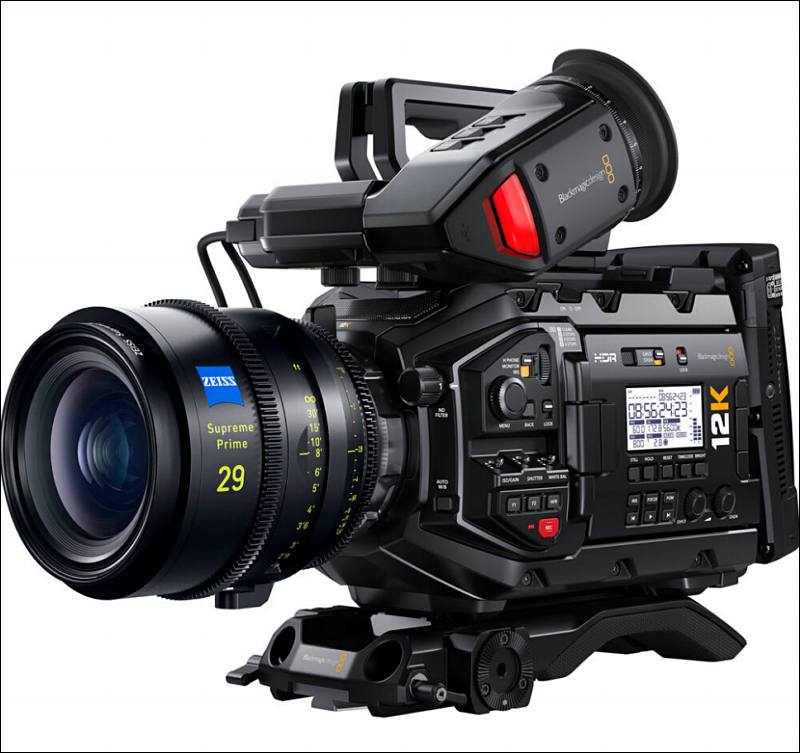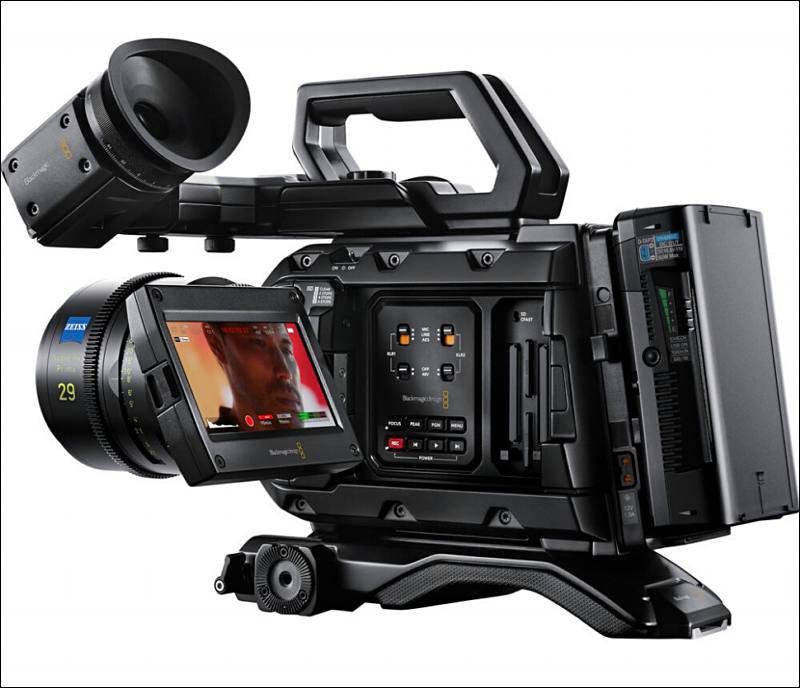
It allows to keep PV going, with more focus towards AI, but keeping be one of the few truly independent places.
-
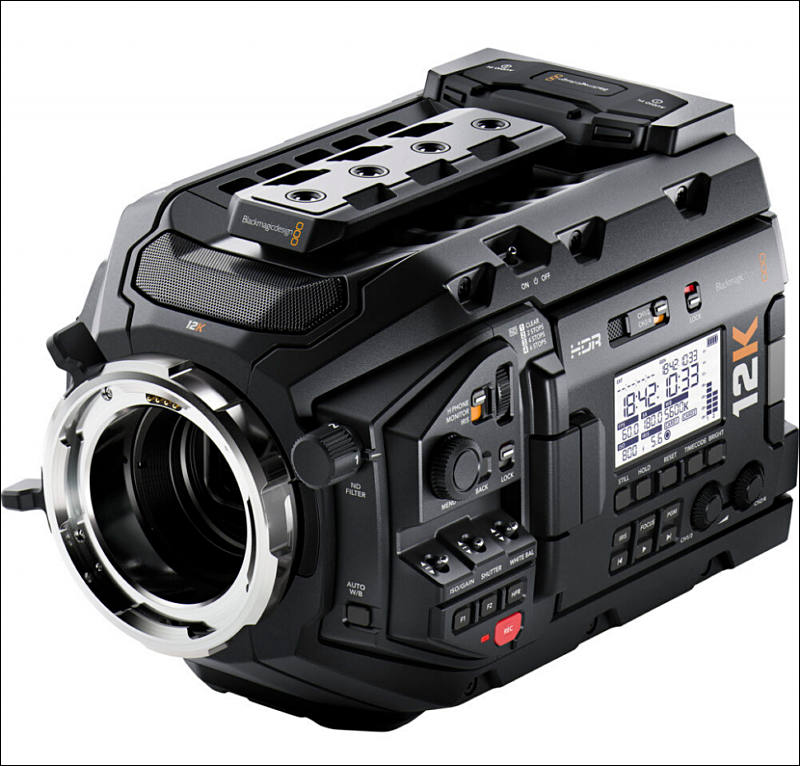
Specs
- 12,288 x 6480 12K Super 35 sensor
- 14 stops of dynamic range
- Native ISO - 800
- Not usual bayer sensor - instead has equal amounts of red, green and blue pixels
- User-Changeable PL Lens Mount
- $9995 at https://www.bhphotovideo.com/c/product/1578059-REG/blackmagic_design_ursa_mini_pro_12k.html
- Storage Features
- 2 x CFast 2.0
- 2 x SD UHS-II cards
- 1 x high speed USB-C expansion port for external media.
- Storage Rates, based on 24 frames per second.
- 12K - 12,288 x 6480
- Blackmagic RAW 5:1 - 578 MB/s
- Blackmagic RAW 8:1 - 361 MB/s
- Blackmagic RAW 12:1 - 241 MB/s
- Blackmagic RAW 18:1 - 160 MB/s
- Blackmagic RAW Q0 - 241 to 578 MB/s 1
- Blackmagic RAW Q1 - 144 to 361 MB/s 2
- Blackmagic RAW Q3 - 96 to 241 MB/s 3
- Blackmagic RAW Q5 - 72 to 180 MB/s 4
- 8K - 8192 x 4320
- Blackmagic RAW 5:1 - 258 MB/s
- Blackmagic RAW 8:1 - 161 MB/s
- Blackmagic RAW 12:1 - 107 MB/s
- Blackmagic RAW 18:1 - 72 MB/s
- Blackmagic RAW Q0 - 107 to 258 MB/s 1
- Blackmagic RAW Q1 - 64 to 161 MB/s 2
- Blackmagic RAW Q3 - 43 to 107 MB/s 3
- Blackmagic RAW Q5 - 32 to 81 MB/s 4
- 6K - 6144 x 3240
- Blackmagic RAW 5:1 - 145 MB/s
- Blackmagic RAW 8:1 - 91 MB/s
- Blackmagic RAW 12:1 - 61 MB/s
- Blackmagic RAW 18:1 - 40 MB/s
- Blackmagic RAW Q0 - 61 to 145 MB/s 1
- Blackmagic RAW Q1 - 36 to 91 MB/s 2
- Blackmagic RAW Q3 - 24 to 61 MB/s 3
- Blackmagic RAW Q5 - 18 to 45 MB/s 4
- 4K - 4096 x 2160
- Blackmagic RAW 5:1 - 65 MB/s
- Blackmagic RAW 8:1 - 41 MB/s
- Blackmagic RAW 12:1 - 27 MB/s
- Blackmagic RAW 18:1 - 18 MB/s
- Blackmagic RAW Q0 - 27 to 65 MB/s 1
- Blackmagic RAW Q1 - 16 to 41 MB/s 2
- Blackmagic RAW Q3 - 11 to 27 MB/s 3
- Blackmagic RAW Q5 - 8 to 20 MB/s 4
- Recording Formats
- Blackmagic RAW Q0, Q1, Q3, Q5, 5:1, 8:1, 12:1 and 18:1 at 12,288 x 6480, 11,520 x 6480, 12,288 x 5112, 7680 x 6408, 8192 x 4320, 7680 x 4320, 8192 x 3408, 5120 x 4272, 6144 x 3240, 4096 x 2160, 3840 x 2160, 4096 x 1704 and 2560 x 2136 stored as 12 bit non-linear with film, extended video, video or custom 3D LUT embedded in metadata.

 sa13776.jpg800 x 766 - 88K
sa13776.jpg800 x 766 - 88K -
It is precisely aimed and one of th ebest engineered product of last 10 years.
Also announced at the right time.
-
Couldn’t be better timing.
I agree on best product in 10 years. The exterior case with well proven ergonomics and buttons. Must be new SoC or LSI x2 I don’t know but I see two soket pcb in this case. If not from where did they get 12k processing for thin air? Must be two SoC inside of 6k
-
Here you go
-
@johnbrawley thanks for that. Do you know if the shots of the harbor and the resolution zoom out that Grant Petty showed are available to view somewhere online in better IQ than on the stream?
@all there are some of @johnbrawley's clips online to download https://www.blackmagicdesign.com/products/blackmagicursaminipro
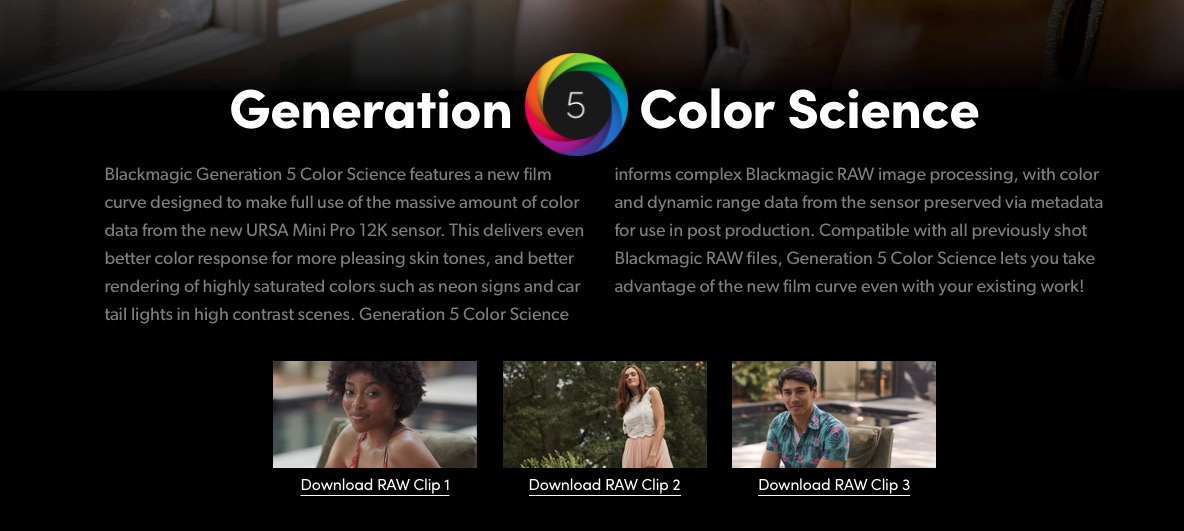

 Screen Shot 2020-07-16 at 9.44.26 PM.jpg1184 x 531 - 132K
Screen Shot 2020-07-16 at 9.44.26 PM.jpg1184 x 531 - 132K -
What is the sensor size? Full frame? Larger? I wasn't paying full attention during the livestream.
-
I added some sensor info to top post.
-
@Vitaliy_Kiselev interesting that they can pack 12k pixels in a S35 frame, but I prefer the traditional cine DoF anyway. Does it have dual ISO circuits? since it's a new sensor, I assume nothing.
-
PR
Blackmagic Design announced Blackmagic URSA Mini Pro 12K, a new digital film camera with an advanced 12,288 x 6,480 12K Super 35 image sensor, 14 stops of dynamic range and high frame rate shooting at up to 60 frames per second in 12K at 80 megapixels per frame. This new 3rd generation model supports new Blackmagic Generation 5 Color Science and higher Blackmagic RAW performance, all in the award winning URSA Mini Pro camera body.
Blackmagic URSA Mini Pro 12K will be available in July 2020 from Blackmagic Design resellers worldwide for US$9,995.
Blackmagic URSA Mini Pro 12K is a revolution in digital film with a 12,288 x 6480 12K Super 35 sensor and 14 stops of dynamic range, built into the award winning URSA Mini body. The combination of 80 megapixels per frame, new color science and the flexibility of Blackmagic RAW makes working with 12K a reality. Oversampling from 12K gives customers the best 8K and 4K images with the subtle skin tones and extraordinary detail of high end still cameras. Customers can shoot at 60 fps in 12K, 110 fps in 8K and up to 220 fps in 4K Super 16. URSA Mini Pro 12K features an interchangeable PL mount, as well as built in ND filters, dual CFast and UHS-II SD card recorders, a SuperSpeed USB-C expansion port and more.
URSA Mini Pro 12K's extreme resolution goes well beyond traditional motion picture film. Customers get the benefits of shooting with film including incredible detail, wide dynamic range and rich, deep color. Perfect for feature films, episodic television and immersive, large format IMAX. The incredible definition around objects makes it ideal for working with green screen and VFX including compositing live action and CGI. Super sampling at 12K means customers not only get better color and resolution at 8K, but also a smoothness that comes from making aliasing invisible.
The Blackmagic URSA Mini Pro 12K features a revolutionary new sensor with a native resolution of 12,288 x 6480, which is an incredible 80 megapixels per frame. The Super 35 sensor has a superb 14 stops of dynamic range and a native ISO of 800. The new 12K sensor has equal amounts of red, green and blue pixels and is optimized for images at multiple resolutions. Customers can shoot 12K at 60 fps or use in-sensor scaling to allow 8K or 4K RAW at up to 110 fps without cropping or changing their field of view. URSA Mini Pro's interchangeable lens mount lets customers choose from the widest range of vintage and modern cinema lenses, so customers can capture every ounce of character and detail from their favorite optics.
The URSA Mini Pro 12K sensor and Blackmagic RAW were designed together to make 12 bit RAW workflows in 12K effortless. As an incredibly efficient next generation codec Blackmagic RAW lets customers shoot 12K and edit on a laptop, a capability that simply isn't possible with other codecs. The massive resolution of the sensor means you can reframe shots in post for delivery in 8K and 4K. It's like a multi camera shoot with only one camera. And it's perfect for great looking vertical and square video, too. The advanced design of the sensor and Blackmagic RAW means that customers can work in any resolution in post production instantly, without rendering, while retaining the full sensor's color accuracy.
Only Blackmagic RAW makes cinema quality 12-bit, 80 megapixel images at up to 60 frames a reality. Constant quality Q0 and Q5 options and new Q1 and Q3 lock the quality level, allowing compression to adapt, matching the detail of the scene. Constant bitrate encoding options 5:1, 8:1, 12:1 and the new 18:1 are designed to give customers the best possible images with predictable and consistent file size. Customers can record RAW to two cards simultaneously so customers can shoot 12K or 8K to either CFast or UHS-II cards, even at high frame rates. Blackmagic RAW stores camera metadata, lens data, white balance, digital slate information and custom LUTs to ensure consistency of image on set and through post production.
Shooting RAW in 12K preserves the deepest control of detail, exposure and color during post. Oversampling means customers get extremely sharp 8K without harsh edges. Best of all, Blackmagic RAW is designed to accelerate 12K for post production, making it as easy to work with as standard HD or Ultra HD files. It is highly optimized, multi‑threaded, works across multiple CPU cores and is also GPU accelerated to work with Apple Metal, CUDA and OpenCL. So customers can always work with their camera RAW files without having to make proxies. Blackmagic RAW 12K images provide unprecedented resolution and quality for color, keying, compositing, reframing, stabilization and tracking in 4K or 8K.
Blackmagic Generation 5 Color Science features a new film curve designed to make full use of the massive amount of color data from the new URSA Mini Pro 12K sensor. This delivers even better color response for more pleasing skin tones, and better rendering of highly saturated colors such as neon signs and car tail lights in high contrast scenes. Generation 5 Color Science informs complex Blackmagic RAW image processing, with color and dynamic range data from the sensor preserved via metadata for use in post production. Compatible with all previously shot Blackmagic RAW files, Generation 5 Color Science lets customers take advantage of the new film curve even with their existing work.
URSA Mini Pro 12K is multiple cameras in one, shooting standard resolutions and frame rates in 4K, 8K and even insanely detailed 12K. With a massive 80 megapixels per frame at 60 fps in RAW customers can capture perfect stills and motion shots in a single camera at the same time. Customers can shoot up to 60 fps in 12K 12,288 x 6480 17:9. For higher frame rates, customers can shoot 110 fps at 8192 x 4320, 140 fps at 8192 x 3408 and even window the sensor to Super 16 to capture 4K at an incredible 220 fps at 4096 x 2160 DCI. URSA Mini Pro 12K has flexible frame rate and resolution options, and captures with improved motion rendering which means that customers get smoother edges in 8K and 4K even at lower frame rates.
URSA Mini Pro 12K is the ultimate high bandwidth recorder with 3 options for recording 12K, which contains almost 10 times the resolution of Ultra HD. Customers get dual built in CFast and UHS-II SD card recorders, and a SuperSpeed USB-C expansion port for recording to fast SATA and NVMe drives. With "Record RAW on 2 Cards" turned on, URSA Mini Pro 12K can record simultaneously across two cards up to an incredible 900MB/s to 2 CFast cards, or an impressive 500MB/s to 2 UHS-II SD cards. The SuperSpeed USB-C expansion port on the rear can record to USB-C flash storage up to 900MB/s as a third recording option so customers won't be short of choices for capturing stunning 12K up to 60p or 8K up to 110p.
Different projects require different lenses which is why URSA Mini Pro features an interchangeable lens mount. Customers can quickly switch between PL, EF and F mount lenses on the URSA Mini Pro 12K, as well as B4 lenses on the URSA Mini Pro 4.6K G2. That means customers can work with high quality large PL cinema lenses, EF or F mount photographic lenses, and even B4 broadcast lenses, making URSA Mini Pro compatible with the widest possible range of professional lenses.
Blackmagic URSA Mini Pro features an innovative high speed USB-C Expansion Port. The 4.6K G2 model features USB-C 3.1 Gen 1 which operates at up to 5 Gb/s, while the new 12K model has a USB-C 3.1 Gen 2 for a blistering 10 Gb/s. Customers can connect and power external flash disks and SSDs or on URSA Mini Pro 12K customers can connect the new URSA Mini Recorder for recording to fast NVMe SSD drives for longer recording times. NVMe SSD drives are ideal for shooting 12K in the highest constant quality 12‑bit Blackmagic RAW in the Q0 setting or for high frame rates. When shooting is complete customers can simply move the external disk to their computer and start editing from the same disk, eliminating file copying.
URSA Mini Pro includes a full version of DaVinci Resolve Studio. Customers get the world's most advanced solution that combines professional editing, color correction, audio post and visual effects all in one software tool. DaVinci Resolve is used to finish more Hollywood feature films than any other solution, so users will get the best possible post production tools to edit native video from their camera and retain every bit of quality. Whether users are working on major Hollywood feature films, episodic television, music videos, commercials or even the latest YouTube shoot, DaVinci Resolve Studio gives customers a completely lossless workflow for native editing, color correction, effects, audio and delivery.
The new Blackmagic URSA Mini Recorder lets customers record 12-bit Blackmagic RAW files onto fast 2.5 inch SSDs, including the latest U.2 NVMe Enterprise SSDs. SSDs such as the latest 7mm U.2 NVMe disks are super fast, delivering data transfer speeds of up to 900 MB/s. This blazing fast performance allows customers longer recording times for full resolution 4K, 8K and 12K 12-bit Blackmagic RAW files in the highest quality Q0 encoding. The unique design of the Blackmagic URSA Mini Recorder means it attaches directly to the back of their URSA Mini Pro between the camera and the battery. It's controlled via the USB-C so customers don't have to worry about manually starting or stopping the SSD recorder.
"With Blackmagic URSA Mini Pro 12K we have advanced imaging technology into a new generation where new styles of shooting will be possible", said Grant Petty, CEO, Blackmagic Design. "It's not just the 12K sensor, but there are so many other innovations in this camera. From the Generation 5 Color Science, the in sensor scaling, new symmetrical color pattern, full RGB quality and of course the 12K resolution, it's going to be exciting to see what DOPs do creatively with this technology!"
Blackmagic URSA Mini Pro 12K Features
- 12,288 x 6480 12K Super 35 sensor.
- Use for feature films, VFX and high end TVC's.
- 14 stops of dynamic range and native 800 ISO.
- New Blackmagic RAW for real time 12K editing.
- Blackmagic RAW optimized for Metal, CUDA and OpenCL.
- Generation 5 Color Science with new film curve.
- Shoot up to 60 fps in 12K, 110 fps at 8K and 220 fps at 4K.
- Dual card CFast recording at up to 900MB/s.
- PL mount included, EF and F mounts available.
- SuperSpeed USB-C for recording to external disks.
- Includes DaVinci Resolve Studio for post production.
- Compatible with new Blackmagic URSA Mini Recorder.
Availability and Price
Blackmagic URSA Mini Pro 12K will be available in July 2020 for US$9,995, excluding duties, from Blackmagic Design resellers worldwide.
-
Sensor parts from video
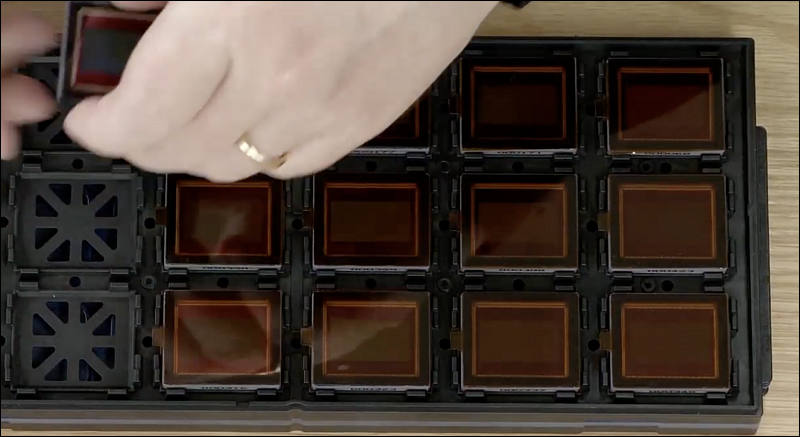
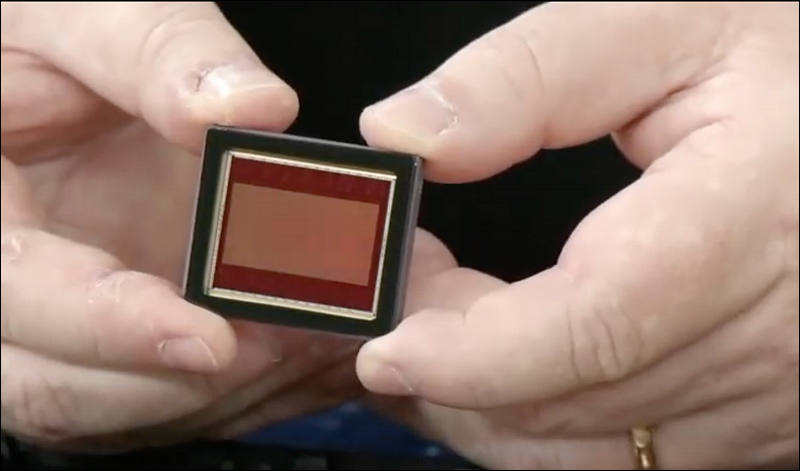
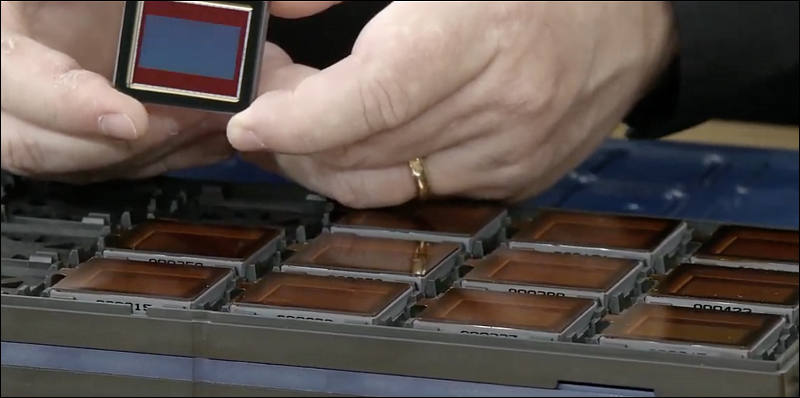
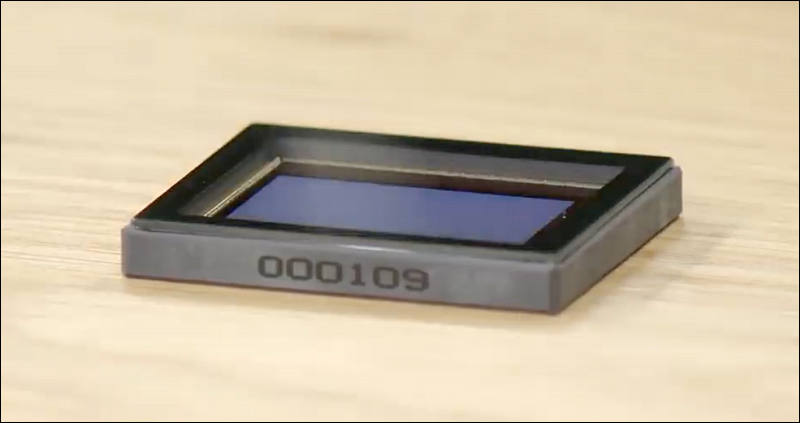

 sa13787.jpg800 x 437 - 50K
sa13787.jpg800 x 437 - 50K
 sa13788.jpg800 x 471 - 34K
sa13788.jpg800 x 471 - 34K
 sa13789.jpg800 x 398 - 41K
sa13789.jpg800 x 398 - 41K
 sa13790.jpg800 x 423 - 28K
sa13790.jpg800 x 423 - 28K -
@Vitaliy....ok I get it. They leapfrogged two sony generations in one day. But why is it precisely timed ? In fact why would any radical technology evolution be well-timed now ? Is it because it's half price ? I can't say 12k will reach my living room any decade soon. So far I don't see it's feasibility. I see alot more wannbees claiming to be cinematographers. Some advertising groups and some studios will see it as future proofing. But how many have a new camera budgeted for this year ?
-
This camera had been ready for around NAB time (fully).
But they did smart think announcing it after Canon and before Sony.
Yes, it is not compact everyday use camera, but int his climate it is direct competititor.
Also BM hopes to get bigger peace of pie as lot of small business owners will be now forced to work for big companies.
-
@kurth 12k is not intended for view on 12k non existent monitors, its main use is reframing during editing. And that's really useful, considering you can not only change the composition by cutting out something or centering the subject, but also you can have from the same camera all the crops from full figure to close shot.
-
@jazzroy....i get it. You could even just have north east south and west setups cause you just need it pointing in the general direction. Or blind cinematographers could shoot in the direction of the sound and someone later could frame. I bet it converts to great fhd too. But I'll wait and see before I put it on my 2030 wishlist.
-
what I think is missing from this discussion is which optics resolve 12k of resolution... I have a poor handle of this, but I remember back in the day the specs of Fujinon zoom lens, warning they resolved only about 950 lines, not the full HD raster. I'm sure the concept scales up..
-
For example all Samsung latest XP lineup (and corresponsing cine lenses), if you want cheaper things.
-
It looks like the major point they are talking is you can get real 4K resolution with full RGB data per pixel that way, with some room to crop. Plus you get 12K as a bonus and nice label to brag about.
The way they operate the sensor dont look irrelevant to me, its a feature that could fit nicely into photo/video hibrid cameras in a way that the "dslr revolution" never happened to be.
-
It's not just real 4K. That's a kind of misleading label. I get why you have that as a label, but the image is something altogether more than that.
@endotoxic there's no such thing as 8K or 4K lenses. Resolution is really only one way to measure a lens performance. Many would argue it's one of the least important. A lens is an analog device. Look at what people have been doing for years with older and vintage lenses on newer sensors.
I actually thought the same as you. Why would you want 12K on a face. That will be bad.
In truth it's not. It's actually more flattering. It's smoother, it has a more nuanced feel. Most of the models I shot had minimal make up to no make up.
@radikalfilm Theres some great options out there if image sharpness is what's most important. The Zeiss Otus are seemingly similar to the Zeiss Supremes that I shot with.
Note, one of the beta tested just posted some AMAZING landscape frames using the Sigma 18-35 that look really nice. Lenses don't have K's.
It's a S35 sensor but 17:9 for DCI.
Not a dual gain design, but they can have a dual gain effect by cleverly combining the exposure of the unfiltered W pixels with the combined RGB pixels to create a dual gain exposure.
@kurth I think it's important to see the whole picture here. It's 12K, but that's a side effect of the novel new way they designed the sensor at a pixel level. Almost a side effect of wanting to make a better pixel level design.
That's what I see as significant here. The colour, the way it reproduces colour. I feel like I'm seeing better colour discretion when I'm grading, I'm seeing more colours reflected in people faces form their environments.
@CFreak I don't think those harbour shots are available. It was one of the first things they shot with the camera quite a long time ago. That location is a few mins from BMD's office. I know it was shot with a very early prototype and using a Zeiss Otus.
JB
Howdy, Stranger!
It looks like you're new here. If you want to get involved, click one of these buttons!
Categories
- Topics List23,965
- Blog5,723
- General and News1,343
- Hacks and Patches1,151
- ↳ Top Settings33
- ↳ Beginners254
- ↳ Archives402
- ↳ Hacks News and Development56
- Cameras2,361
- ↳ Panasonic990
- ↳ Canon118
- ↳ Sony154
- ↳ Nikon96
- ↳ Pentax and Samsung70
- ↳ Olympus and Fujifilm99
- ↳ Compacts and Camcorders299
- ↳ Smartphones for video97
- ↳ Pro Video Cameras191
- ↳ BlackMagic and other raw cameras121
- Skill1,961
- ↳ Business and distribution66
- ↳ Preparation, scripts and legal38
- ↳ Art149
- ↳ Import, Convert, Exporting291
- ↳ Editors191
- ↳ Effects and stunts115
- ↳ Color grading197
- ↳ Sound and Music280
- ↳ Lighting96
- ↳ Software and storage tips267
- Gear5,414
- ↳ Filters, Adapters, Matte boxes344
- ↳ Lenses1,579
- ↳ Follow focus and gears93
- ↳ Sound498
- ↳ Lighting gear314
- ↳ Camera movement230
- ↳ Gimbals and copters302
- ↳ Rigs and related stuff272
- ↳ Power solutions83
- ↳ Monitors and viewfinders339
- ↳ Tripods and fluid heads139
- ↳ Storage286
- ↳ Computers and studio gear560
- ↳ VR and 3D248
- Showcase1,859
- Marketplace2,834
- Offtopic1,319


